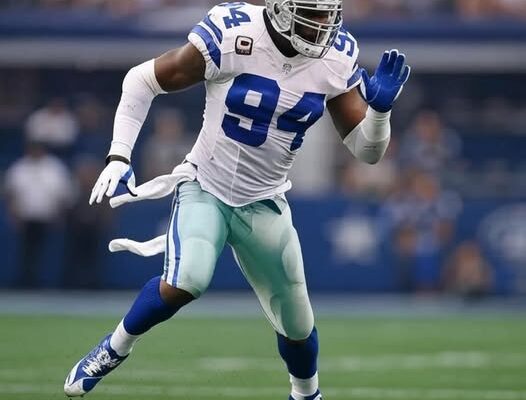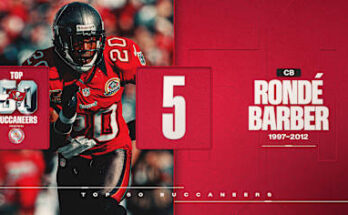DeMarcus Ware was destined for greatness—not merely due to his remarkable athleticism, but because of the heart, humility, and relentless drive he brought to every play. From his roots to his rise, he was built for it.
DeMarcus Ware was destined for greatness—not simply because he possessed the physical tools necessary to dominate in the NFL, but because of something deeper, more enduring. His greatness came from a relentless work ethic, a genuine humility, and a fire inside him that never stopped burning, no matter the circumstances. Born in Auburn, Alabama, in 1982, Ware’s story is not just one of talent realized, but of character revealed through years of sacrifice, determination, and unwavering commitment to being the best version of himself both on and off the football field.
Growing up in modest surroundings, Ware didn’t have the luxury of being pampered as a rising star. He wasn’t heavily recruited or hyped by national media outlets in high school. He wasn’t handed accolades on a silver platter. Everything he achieved, he earned through grit. At Auburn High School, he was a multi-sport athlete who stood out for his speed and explosiveness, but it was clear to those around him that he was still learning how to harness his raw ability. What separated him even then wasn’t simply what he could do physically, but how he conducted himself—disciplined, driven, and respectful, always striving to be better.
His journey to the NFL wasn’t the typical path of a five-star recruit headed straight to a powerhouse program. Instead, Ware committed to Troy University, a smaller Division I school where he could develop away from the bright lights. At Troy, he made the most of every opportunity. Coaches quickly recognized not only his freakish athleticism but also his leadership and thirst to learn. He hit the weight room with a fury, studying film, sharpening his technique, and absorbing the game at every level. Over his collegiate career, he transformed from a lanky prospect into a terror off the edge. By the time he finished at Troy, Ware had racked up 27.5 sacks and 55.5 tackles for loss—numbers that demanded the NFL’s attention.
When the 2005 NFL Draft arrived, Ware’s combination of size, speed, and motor made him an intriguing prospect. The Dallas Cowboys held the 11th overall pick and were in desperate need of a dynamic pass rusher. Head coach Bill Parcells saw something special in Ware, not just in terms of production but in potential. On draft night, the Cowboys made Ware their first-round pick, making him the highest-drafted player in Troy University history. For Ware, it was validation—but not a destination. He knew the real work was just beginning.
From the moment he stepped onto an NFL field, Ware showed he belonged. His rookie season ended with eight sacks, a sign of things to come. Over the next few years, he steadily improved, becoming one of the league’s most feared edge rushers. What made Ware such a dominant force wasn’t just his speed off the line or his ability to bend around blockers—it was his discipline, his hand usage, his understanding of timing and leverage. He turned rushing the passer into an art form, one where every detail mattered.
In 2008, Ware delivered what many still consider one of the greatest seasons ever by a defensive player. He recorded 20 sacks, forced six fumbles, and was named a first-team All-Pro. His explosiveness off the snap was virtually unstoppable, and he began drawing double and triple teams regularly. Yet he never complained. He welcomed the attention, knowing it meant his teammates had opportunities. That selflessness defined Ware just as much as his stats did.
Despite all his personal accolades—nine Pro Bowl selections, four first-team All-Pro honors, and more than 130 career sacks—Ware remained humble. He was known around the league as a consummate professional, someone who practiced like it was a game and led by example. He didn’t boast or seek the spotlight. He let his play do the talking. He was a mentor in the locker room, the kind of leader younger players gravitated toward. And for all his ferocity on the field, he was soft-spoken and grounded off it.
Perhaps the most defining chapter of Ware’s career came after he left Dallas. In 2014, after nine seasons with the Cowboys, he signed with the Denver Broncos. By that point, some believed he was past his prime. But Ware wasn’t ready to slow down. In Denver, he took on a new role—not just as a pass rusher, but as a veteran leader for a young and talented defense. He became a mentor to players like Von Miller, helping shape one of the most dominant defensive units in recent memory.
That mentorship paid off in 2015, when the Broncos defense carried the team to a Super Bowl 50 victory. Ware had a massive impact during the playoff run, especially in the AFC Championship Game against the New England Patriots, where he pressured Tom Brady relentlessly. In the Super Bowl, Ware recorded two sacks and was a calming force in the locker room. For a player who had given so much to the game, the championship was more than a trophy—it was the culmination of years of hard work, setbacks, and persistence.
Even after retirement, Ware’s influence continued to grow. He remained close to the game, helping train young pass rushers and offering insight as an analyst. He also focused on personal growth and giving back, using his platform to support various charities and causes. Despite his immense success, Ware stayed true to his roots—always approachable, always gracious.
In 2023, Ware was inducted into the Pro Football Hall of Fame. It was a fitting tribute for a player who had given everything to the game. His speech reflected the values that had carried him from Auburn to Canton—faith, family, discipline, and humility. He spoke not just about the big moments on the field but about the people who helped him along the way. His mother. His coaches. His teammates. He never made it about himself, which made the moment all the more powerful.
Ware’s legacy isn’t just in his sack totals or highlight reels. It’s in the way he carried himself—with dignity, with grace, and with a relentless pursuit of excellence. He showed what it meant to be great not just in talent but in character. He set a standard for what a professional athlete should be.
The path Ware walked was not paved with ease. There were injuries. There were tough seasons. There were moments of doubt. But he never wavered. He adapted, he evolved, and he kept pushing. That perseverance is what makes his story resonate beyond football. It’s a lesson in resilience, in staying true to your values, and in giving your all no matter the circumstances.
To understand DeMarcus Ware is to understand that greatness is more than just highlight plays or statistics. It’s about the way you approach your craft, the way you treat others, and the example you set for those who follow. Ware did all of that and more. He inspired teammates, challenged opponents, and earned the respect of fans and peers alike.
In an era of flash and self-promotion, Ware was a throwback—quietly dominant, endlessly prepared, and fiercely competitive. He reminded us that true greatness comes not from talking about it, but from doing the work day after day, year after year. His story is one that young athletes should study, not just for what he achieved, but for how he achieved it.
Even now, years removed from his last snap, Ware’s presence still looms large. His techniques are studied by pass rushers across the league. His leadership style is cited by coaches trying to build a culture. And his humility remains a guiding light for those who understand that the game, at its best, reflects the values of hard work, respect, and heart.
DeMarcus Ware was built for greatness. Not because it was handed to him, but because he built it—snap by snap, rep by rep, moment by moment. From the small-town beginnings to the Hall of Fame stage, he proved that with enough heart, humility, and hunger, anything is possible. He wasn’t just a football player. He was a standard. A symbol. And above all, a reminder that greatness is earned, never given.



